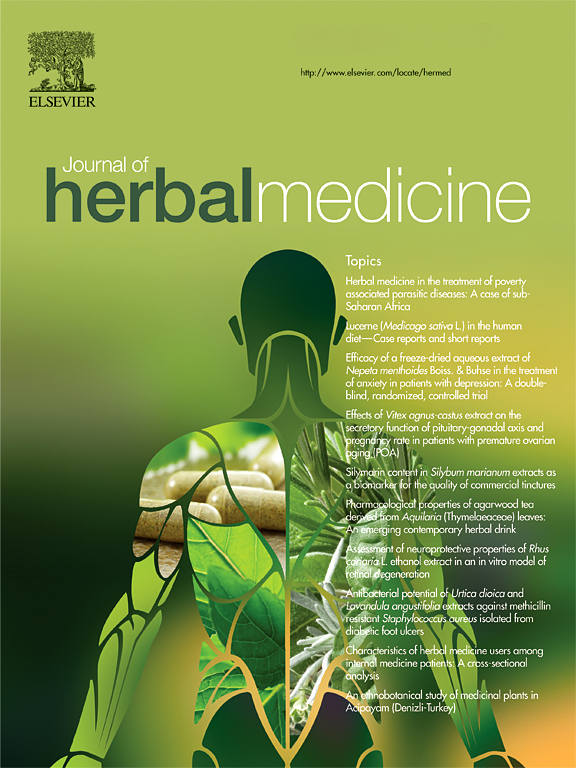Triphalakatakanpathadi Kashaya对斯里兰卡2型糖尿病患者血糖控制和生活质量的影响——一项描述性观察研究
IF 1.9
4区 医学
Q2 INTEGRATIVE & COMPLEMENTARY MEDICINE
引用次数: 0
摘要
糖尿病(DM)是一项重大的全球健康负担,经常导致并发症和生活质量下降。阿育吠陀是一种传统的全球医学体系,经常使用卡沙亚(草药煎剂)来治疗糖尿病。目的探讨TKPK (Triphalakatakanpathadi Kashaya)对2型糖尿病患者血糖控制及生活质量的影响。材料和方法在斯里兰卡Bandaranaike纪念阿育吠陀研究所(BMARI)进行了一项描述性观察性研究,涉及46例接受TKPK治疗6个月的患者。采用生活质量问卷(SF-36)收集血糖参数、糖尿病相关体征和症状及生活质量数据,采用配对t检验和Wilcoxon符号秩检验进行分析。结果stkpk使HbAIc平均基线值从7.11%降至6.58% (p <;0.05),平均基线空腹血糖从172.4±6.03 mg/dl降至141.4±4.99 mg/dl (p <;6个月后0.05)。显著改善(p <;糖尿病相关体征和症状差异无统计学意义(0.05)。转氨酶(AST &;ALT)和血清肌酐水平在整个研究期间保持在正常范围内,反映了TKPK的安全性。生活质量显著提高(p <;0.05)。结论tkpk对2型糖尿病患者具有降低血糖、改善生活质量的作用。TKPK成分的科学证据表明,抗炎和抗氧化特性是其降糖作用的重要因素。然而,观察性研究存在局限性,需要进一步的临床试验来确定该配方的有效性。本文章由计算机程序翻译,如有差异,请以英文原文为准。
Effect of Triphalakatakanpathadi Kashaya on glycaemic control and quality of life in type 2 diabetes mellitus in Sri Lankan population – A descriptive observational study
Introduction
Diabetes mellitus (DM) presents a significant global health burden, often leading to complications and reduced quality of life. Ayurveda, a traditional system of medicine practiced globally, often uses Kashaya (herbal decoctions) for the management of diabetes.
Aim
This article aims to assess the effect of Triphalakatakanpathadi Kashaya (TKPK) on glycemic control and quality of life in patients with type 2 diabetes.
Material and methods
A descriptive observational study was conducted involving 46 patients treated with TKPK for six months at Bandaranaike Memorial Ayurveda Research Institute (BMARI), Sri Lanka. Data on glycemic parameters, diabetes related signs and symptoms, and quality of life using the short form of quality of life questionnaire (SF-36) were collected and analyzed using paired t-test, and Wilcoxon signed rank test.
Results
TKPK led to significant reduction in mean baseline value of HbAIc from 7.11% to 6.58% (p < 0.05) and mean baseline fasting blood sugar level from 172.4 ± 6.03 mg/dl to 141.4±4.99 mg/dl (p < 0.05) after six months. Significant improvements (p < 0.05) were observed in diabetes related signs and symptoms. Transaminases (AST & ALT) and serum creatinine levels remained within normal ranges throughout the study period reflecting the safety of TKPK. Quality of life was enhanced significantly (p < 0.05) in all the patients.
Conclusion
TKPK demonstrates the efficacy to lower blood glucose and improve the quality of life in type 2 DM patients. Scientific evidence of TKPK’s ingredients, suggest anti-inflammatory and anti-oxidant properties as contributing factors for its hypoglycemic effect. However, observational study imposes limitations, and warrant further clinical trials to establish the efficacy of this formulation.
求助全文
通过发布文献求助,成功后即可免费获取论文全文。
去求助
来源期刊

Journal of Herbal Medicine
INTEGRATIVE & COMPLEMENTARY MEDICINE-
CiteScore
3.90
自引率
0.00%
发文量
94
期刊介绍:
The Journal of Herbal Medicine, the official journal of the National Institute of Medical Herbalists, is a peer reviewed journal which aims to serve its readers as an authoritative resource on the profession and practice of herbal medicine. The content areas of the journal reflect the interests of Medical Herbalists and other health professionals interested in the clinical and professional application of botanical medicines. The objective is to strengthen the research and educational base of herbal medicine with research papers in the form of case studies, original research articles and reviews, monographs, clinical trials and relevant in vitro studies. It also publishes policy statements, opinion pieces, book reviews, conference proceedings and profession related information such as pharmacovigilance reports providing an information source for not only the Herbal Practitioner but any Health professional with an interest in phytotherapy.
 求助内容:
求助内容: 应助结果提醒方式:
应助结果提醒方式:


